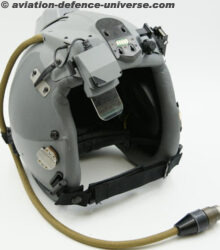Melbourne, Florida. 15 April 2024. SD Government SDG, the satellite communications provider for global governments and the US Air Force, has successfully tested the Roll-on/Roll-off (RO/RO) Beyond Line of Sight (BLOS) satellite communications (SATCOM) capability SDG developed with Florida-based R4 Integration, Inc. (R4i) in a 26-hour 20-minute mission aboard a Lockheed Martin C-130J-30 Hercules. Following the intense validation flight, the SD/R4i Tactical Removeable Airborne Satellite Communications (TRASC) BLOS solution is now fully available for US Air Force use.
Performed as part of Exercise Gnarly Explodeo, the maximum endurance mission recorded 100% reliability and availability from the TRASC system as it facilitated secure command and control data communications, defense applications, intelligence updates, electronic flight bags, video conferencing, voice over internet and WiFi calls. The equipment connects with the Intelsat FlexAir service, which employs an optimized high-throughput global satellite network to deliver dedicated airtime to government users. The SD/R4i TRASC system supports the commander of Air Mobility Command (AMC), General Mike Minihan, in achieving his intention to have 25% of the AMC fleet connected by 2025.
The SD/R4i TRASC BLOS solution integrates the SD Plane Simple® Ku-band terminal within a Multi-Purpose Hatch System (MPHS) designed to replace the existing C-130 standard upper forward or center fuselage hatches. The SDG team assisted US Air Force maintainers as they installed the system on a 41st Airlift Squadron, 19th Airlift Wing C-130J, at Little Rock Air Force Base, Arkansas.
“This platform enables global command and control, providing our crew with unparalleled situational awareness,” remarked Colonel Denny Davies, 19th Airlift Wing and Little Rock commander, after the mission. “It makes the C-130 much more resilient and capable in the vastness of the Pacific, reinforcing the Air Force’s core tenant of distributed control.”
The turnkey solution mounts the SD Plane Simple® antenna in the MPHS. It includes a compact RO/RO BaseBand kit that integrates a secure enclave, modem, Link-16, airborne router, and power supply. The stand-alone system only requires AC or DC power from the aircraft to operate and distribute real-time BLOS connectivity.
“SD prides itself on rigorously testing all our equipment before we put it into service. The success of this endurance flight exemplifies the power of our advanced technology and its versatility in delivering new capabilities to our forces. We are proud to add this connectivity solution to our growing military portfolio and look forward to supporting the system as it enters into service,” says Hayden Olson, Head of SD Government. “We are already receiving requests for demonstrations of the capabilities of the equipment to USAF representatives, such is the interest in the system.”


































































































































